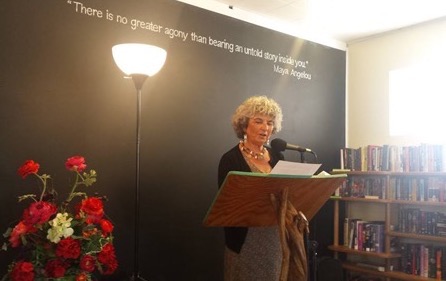One day I got it in my head that I wanted to write a mystery. I had already written books for adult and young readers, literary fiction and magical realism, respectively. One is even bilingual.
But it made sense to try this genre as I love a great mystery, especially one that fools me until the end.
So, I sat down, and the pieces came together fast. Extremely fast. That’s how it works for me. Not to sound like a nut job, but ideas come from somewhere. The same goes for the characters and what they do.
Anyway, it made sense that my protagonist, Isabel Long, would tell the story, so I wrote it in first-person, and because I want my readers to feel they are in the middle of the action, also in present tense.
Isabel’s back story: she has just come off a bad year when this series starts with Chasing the Case. Her husband died and she lost her job as a newspaper’s top editor. She is what the French call une femme d’un certain age. Isabel’s bit of a smart ass but she has a caring heart. Yes, I admit there is quite a lot of me in her.
After a year of proper grieving, Isabel is ready for a new life. And that’s when we first meet her. She decides to solve a 28-year-old mystery of a woman who went missing in her town of a thousand people. It was Isabel’s first big story as a rookie reporter. She plans to use the tools she relied on as a journalist to solve this case. And Isabel has a ‘Watson’ — her 92-year-old mystery-loving mother who’s come to live with her. My own mother, who is 97, inspired this character. Isabel also takes a part-time job at the local watering hole, the Rooster, where not only does she find clues for her cases, but a love interest in its owner, Jack.
Then I found I couldn’t let go of Isabel Long. I gave her more cases to solve in Redneck’s Revenge, Checking the Traps and Killing the Story. On Jan. 27, Working the Beat will be released by my publisher darkstroke books.
I hadn’t expected to write a series, but here I am.
And to get you interested in Working the Beat, here’s an excerpt from an early chapter. Here Isabel and her mother happen to be at the Titus Country Fair when they are approached by Shirley Dawes.
Shirley stays sitting when she sees us approach. I make our introductions, and then we take the seats opposite her at the picnic table. I make sure I’m in Shirley’s direct line of vision in case she reads lips.
“So, what did you want to talk about?” I ask.
Shirley works her mouth a bit.
“It’s about my grandson, Lucas. Lucas Page is his full name. He was killed here four years ago and whoever did it didn’t get caught.”
“Here in Titus?”
She gives her head a shake.
“I mean here at the fair. It was after the demolition derby, the first one they had. They found Lucas’s body the next morning behind where everybody watches, in the woods up there. They said he must’ve been drunk and fell down in the rocks. His head was hit real bad I was told.”
“What was he doing on the hill afterward? Was he alone?”
“That’s what I want you to find out.”
This story’s coming back to me now. I was the editor of the Daily Star then. We reported on an unattended death at the fair in a story that made the front page, and then like Shirley said, it was ruled an accident because of a brain injury, although she protested that in a story we ran, too.
“Now, I remember you, Shirley. You came to see me in the newsroom. You said you were frustrated the police didn’t seem to be looking that hard into your grandson’s case and you wanted us to do that.”
I think back and hope I treated this woman nicely.
“Yeah, I did. You said newspapers don’t do that kind of work.”
“No, not the one I worked for.”
“But I heard about what you’ve been doin’ now as a private investigator. Your last case was a doozy. Read about it in the paper.” She crooks a thumb toward Annette and her son, still talking with his admirers. “Course, there was Chet Waters. Maybe you can do what the cops couldn’t or wouldn’t do.”
“You mean find out what happened that night with your grandson.”
“Yeah. I heard you get paid for doin’ this. I wanna hear how much. I ain’t got a lot. But this is important to me. I loved my grandson. I’m the one who brought him up after his mother gave him to me. He was hangin’ around with a rough crowd in those days. Tryin’ to fit in. Here. Let me show you his picture.”
Shirley reaches for the purse on the seat beside her. The purse is vintage style, off white with a smart clasp on the top, no zippers, something my mother would use. I am guessing Shirley holds onto things. She removes a photo from her wallet and hands it to me.
“I took it at Christmas, the last one we had,” she says.
Lucas Page’s face smiles at me. He’s young, blue-eyed, and with the kind of features that would label him a good-looking guy. His most distinctive is the red hair that’s short on the sides and long enough on the top so it has a bit of curl. But back to that smile. He was happy to pose for his grandmother.
“He was a handsome young man,” I tell Shirley.
She swipes away a tear.
“Yeah, he was.”
I glance at my mother. She’s interested, of course. The questions are forming in my brain, but this isn’t the time to ask them. Already a parade of people I know have passed by with a wave, a hello, and a curious expression on their faces as they wonder why in the heck my mother and I are talking with this woman. They’re just being nosy New Englanders as usual.
“Shirley, we’re interested, but this isn’t the best place to talk. We need some privacy. How about my mother and I come to your home to talk this over?”
“What’d you say? My house?”
“Yes, your house. Well, you could come to ours if you prefer. We live in Conwell. But it would help us if we could see where you and your grandson lived. I should also tell you that if I’m interested in taking your case, I have to clear it with my boss. Do you know Lin Pierce?” I pause as she nods. “He gets a small cut of whatever I make. So, he has a say.” I register the concern in Shirley’s narrowed eyes. “Don’t worry. He hasn’t turned me down yet.”
“I understand,” she says. “Can’t do it tomorrow. I’m helpin’ out in the kitchen here. Monday mornin’ work for you?”
Ma and I exchange glances.
“How about ten?” I say.
Shirley nods.
“Ten, it is. Do you mind if I make a copy of your grandson’s photo with my phone?”
“Go right ahead if it helps.”
I place the photo on the table and remove my cell phone from my bag to take a shot before I hand the photo back to Shirley.
“Here you go.”
Shirley leaves us after she gives me directions to her house in West Titus. She lives on one of those dead-end dirt roads, hers is the last house, that’s also likely one of the last to be plowed in the winter and impassable at times in the spring because of the mud. But she’s probably one of those people who doesn’t mind because she wants to live out of the way of everybody. I don’t have to worry about road conditions this time of year. The road’s been graded recently she told me.
I wait until Shirley is out of earshot as she moves inside the crowd that’s wandering the fairgrounds. She stops first at the pumpkin display, where Annette and Abe are still hanging out.
“What’s your opinion, Ma?”
“I like her. She’s a little rough around the edges like a lot of the people we meet here,” she says. “But it’s about time we found a new case. It was getting a little boring.”
I smile. My 93-year-old mother is game for a new mystery to solve.
“Boring?”
She nods.
ABOUT THE PHOTO ABOVE: Working the Beat has a Jan. 27 release. But if you are a Kindle user, you can download No. 4 Killing the Story for free for two days only.
Here’s the link for Killing the Story: https://mybook.to/killingthestory
Here’s he link for Working the Beat: mybook.to/workingthebeat



